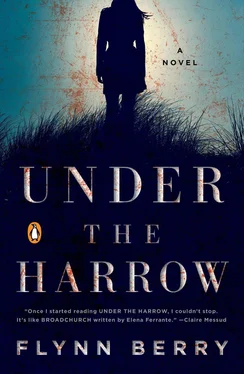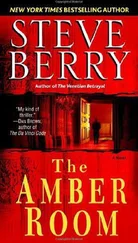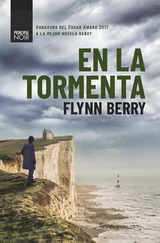“You killed her,” I say, and my voice doesn’t sound like me, it sounds like her.
He shakes his head, either to warn me to stop talking or to correct me. “Do you want to know what I can’t figure out?” he says, staring at the join in the wood. “They never thought about you.”
“I don’t know what you mean.”
“You were in the house with Rachel. The police arrive, you’re waiting outside, covered in her blood, and they don’t arrest you.”
“I found her.”
“If you found her you would want to get away from the house. You’d run to the neighbors or down the road. You wouldn’t wait around, in case whoever did it was still inside. Unless it was you.”
“I wasn’t thinking clearly at that point,” I say. Keith’s body is oddly slack, like he can’t hold himself up properly.
“One of the firemen told me he was watching you, and he said you didn’t cry. And there’s the dog. I can’t get my head around it. What you’re saying is an intruder, someone breaking into the house, killed a trained German shepherd. I don’t know how you could do that without serious injuries, but whoever it was didn’t lose any blood.”
“How do you know that?”
“I’m guessing. They didn’t ask for my blood. I think you slit the dog’s throat while he was sleeping.”
“The police eliminated me.” I remember Moretti asking if it was normal for me to be at the house at that time. He considered me as a suspect.
“How?”
“I don’t know. I didn’t have a weapon.”
“Did Rachel have any knives in her kitchen? You either washed it or hid it afterward.” He lifts his head. “They’re coming for you now. They know what you did, and they know why you did it.”
“I’d never hurt her.”
“Would you throw a bottle at her face?”
“How do you know about that?”
He snorts. “How the fuck do you think? What is it about me that makes it so hard for you to believe?”
I shake my head, and he says, “You broke her nose.”
I don’t argue. It was hard to tell if her nose was broken because of me or what happened to her a few hours later.
“You stole pictures of her.”
“No. Rachel gave them to me. She loved me.”
He laughs at my expression.
“She always said you were a little bitch.”
WE GOT IN a fight at the party. After we played Nevers, before I climbed the stairs, with everything below my knees a fuzzy darkness. Rachel teased me and I snapped at her and then we were through the back door and screaming at each other on the lawn. Rafe said he was going to call it in to the police as a domestic. He said it as a joke, but then Rachel said something to him about me and I took the beer bottle from his hand and threw it at her. It hit her in the face and she inhaled sharply and bent over.
My stomach soured, but then she looked up and laughed with the blood coursing down her face. Clearly the victor. I’d proved her right. She was still laughing when I retreated inside.
The boys kept us apart for the rest of the night. They made huddles around us and joked with us like we were boxers. They acted impressed but mostly they thought we were both mental, a nightmare, like Ali Ross, who at the last party did all the windows in her boyfriend’s car.
Rachel leaned over me, early in the morning. “Nora, do you want to come with me or stay?”
“Stay.”
We fought at most of the parties that summer, if one of us drank enough, which we always did, and if we weren’t too distracted by trying to pull someone. We fought carelessly, the way our friends fought with their mothers, and mostly over nothing.
Every walk home followed the same idiot logic. First silent bitterness, then recrimination, an echo of before but with less slurring. By the time we reached the old center of town one of us said, I don’t want to talk about this anymore. We walked in angry silence past the Norman church and the bakery with our sandals slapping the pavement. Maddening, how our strides joined up even when we didn’t want them to. We looked in opposite directions, a gloomy Janus head.
The fourth stage usually started near the end of the high street. One of us made a remark, often about the party, and a stupid thing someone else had done or said at it. This stage involved more recrimination, but also a few very faint apologies, like, I didn’t think you’d take it that way.
We would start to get bored. The neon sky and the strangeness of the town at that hour would slowly colonize our attention. By the time we crossed onto the estate, the fight would be over.
I can still see Rachel at seventeen, a line of blood curving over her mouth, laughing at me.
I thought if she went on her own she might think about what she had said about me, and that she would be sorry. It drives me to distraction now, that I can’t remember what she said to upset me so much.
KEITH KNOWS ABOUT the fight, and he knows Fenno was trained. The simplest explanation for how he knows these things is that she told him. That they had an affair, or a friendship he thought was an affair. The strange thing is, when he came to see me, he acted like the affair proved his innocence. If anything it means the opposite.
The important thing now is that Keith thinks it’s over for him. He thinks he’s safe. He might think, like I did, that he’s protected from being charged again by a form of double jeopardy. It must be such a sense of relief, after nearly going to prison. He will live the rest of his days a free man. I imagine that on the aqueduct he wants to kneel and kiss the ground. In his house, in the pub, driving the roads. He must be making plans now, with all the years he has, plans to travel, to sleep rough.
If someone were to threaten all that, there is no telling what he would do. Or, really, there is. He is going to attack me, and it will look unprovoked to everyone except the two of us.
I want him back with the police. They know how to snare him by letting him mention some detail of the crime — how the dog was tied, where her body was found — that they never told him, or by interviewing him until his account begins to shift and break apart. Even though they didn’t manage it before, they need more time with him.
The best way to do this is for him to commit another crime. It shouldn’t take very long, someone with a temper like that.
I’ve never understood why the police don’t use bait more often. When someone started to kill women on a mountain in Wales, the police could have sent hikers down the trails. With teams following them, or with guns. They could be policewomen, not civilians. It wasn’t even a very large mountain, they could have baited every trail. Eight victims, over three months, and the murderer has never been found. Fucking stupid.
Grievous bodily harm. He’s ready for it, too. He needs to take it out on someone.
MORETTI GIVES A PRESS conference from a room inside Abingdon station. He asks for anyone who was near the warehouse in Eynsham on Thursday night to make contact with the police. He says that based on early evidence they believe more than one person was responsible for the murders, and he urges anyone with information, however minor, to come forward.
He’s done with Rachel. It’s over for him, unless another development draws him back.
A row of detectives sits beside him behind low, angled microphones. While he speaks, the officers stare at the press audience with blank, judging faces, as though waiting for an outburst. Based on the crowns on their epaulets, some of them are his superiors. I recognize the chief constable, seated near the middle of the row with his hands clasped on the table.
Читать дальше












